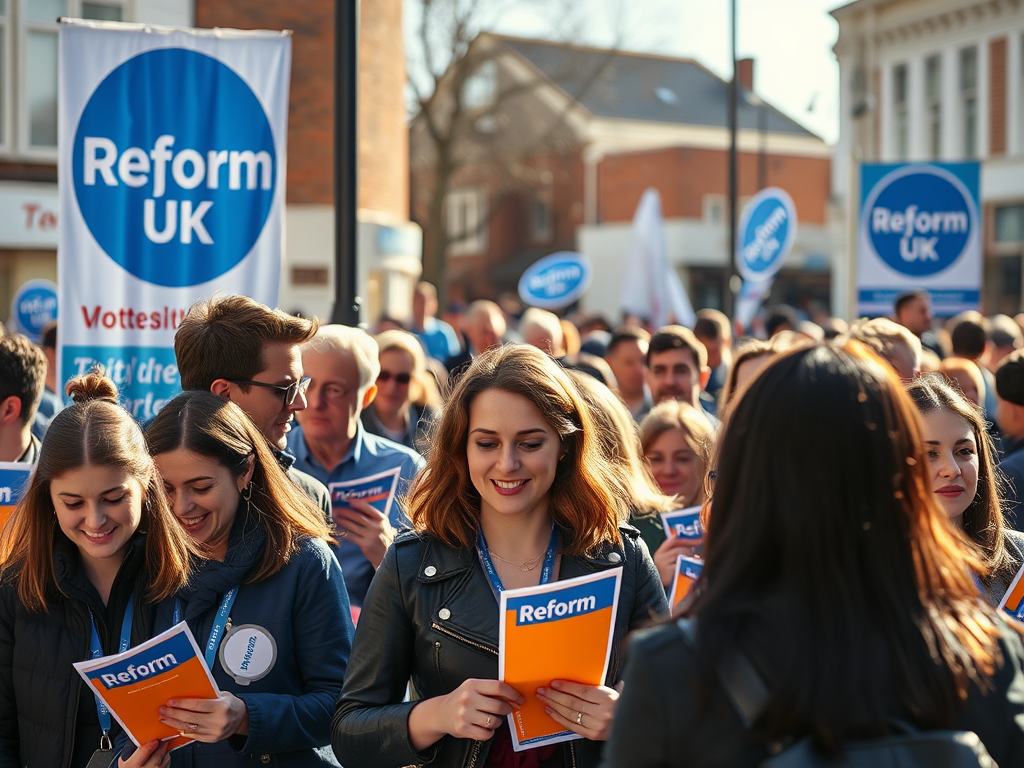The 2025 local elections in the UK have concluded, revealing a significant shift in the country’s political landscape. Reform UK has emerged as a major force, securing 677 seats across contested councils and garnering around 30% of the vote. This performance has surpassed that of traditional parties like Labour and the Conservatives, indicating a dramatic change in voter preferences. The outcome of these elections is likely to have far-reaching implications for UK politics.
Reform UK’s Historic Surge
Reform UK’s success in the 2025 local elections is noteworthy, as the party transitioned from a fringe movement to a significant electoral force. Securing 677 seats and 30% of the vote, Reform UK outperformed Labour and the Conservatives. This achievement is a testament to the party’s growing appeal and its ability to resonate with voters. For more information on Reform UK, visit their official website.

Historic Losses for Labour and Conservatives
The 2025 local elections were marked by significant losses for both Labour and the Conservatives. Labour won just 99 council seats, while the Conservatives secured 317, with neither party achieving a majority in any council. The Conservatives lost control of all 15 councils they previously held, including heartland areas. As a result, senior Labour figures have expressed frustration with Prime Minister Sir Keir Starmer, blaming him for the party’s disastrous showing. For further insights into the Labour Party’s performance, visit their official website. Similarly, the Conservative Party’s official website provides more information on their electoral performance.
Some key points to consider regarding the losses include:
– Labour’s poor performance overshadowed their mayoral wins in Doncaster, North Tyneside, and the West of England.
– The Conservatives lost control of all their previously held councils.
– Both parties suffered significant seat losses, with each losing about two-thirds of their seats compared to the 2021 elections.
The implications of these losses are far-reaching, potentially leading to leadership questions within both parties. For instance, Conservative leader Kemi Badenoch may face scrutiny over the party’s performance. As the political landscape continues to evolve, it will be interesting to see how these parties respond to their losses. You can explore more about the UK’s economic policies and their potential impact on local elections by visiting this article.
Liberal Democrats and Greens: Gains Amidst Turmoil
While Reform UK dominated the elections, the Liberal Democrats and Greens also made significant gains. The Liberal Democrats secured 370 council seats, achieving majorities in Cambridgeshire, Oxfordshire, and Shropshire. According to Lib Dem leader Sir Ed Davey, the party is on course for their seventh year of local election gains, marking their best-ever winning streak. The Green Party achieved an 11% share of the vote, indicating growing support. For more information on the Liberal Democrats, visit their official website, and for the Green Party, visit their official website.
Some notable achievements of the Liberal Democrats and Greens include:
– The Liberal Democrats’ continued streak of local election gains.
– The Green Party’s growing share of the vote.
These gains highlight the shifting dynamics in UK politics, with smaller parties making significant inroads. As the political landscape continues to evolve, it will be interesting to see how these parties capitalize on their successes. If you’re interested in learning more about the UK’s food strategy and its potential impact on local politics, check out this article. You can also consider submitting your favorite local dessert shop to our business directory.
Voter Apathy and Key Contests
The 2025 local elections were characterized by low voter turnout, often less than 30%. This apathy is believed to have contributed to Reform UK’s surge, as disaffected voters turned out to support the party. In key contests like the Cambridgeshire and Peterborough mayoralty, Conservative Paul Bristow narrowly won with 28% of the vote, beating Reform candidate Ryan Coogan who took 23%. Low voter turnout is a concerning trend that may have significant implications for UK democracy.

Election Results, Maps, and Legislative Changes
The 2025 United Kingdom local elections were held on 1 May 2025, with results mapped by Election Maps UK. The elections saw significant changes in the political landscape, with Reform UK emerging as a major force. Some elections were postponed to 2026 due to local government reorganization, following legislation passed in early 2025. Baroness Pinnock’s failed motion to prevent postponement in the House of Lords highlights the complexities of electoral reform. For more information on the election results, visit The Independent’s coverage.
The party vote shares are summarized in the following table:
| Party | Seats Won | Vote Share (%) |
|—————–|———–|—————-|
| Reform UK | 677 | 30 |
| Labour | 99 | 20 |
| Conservatives | 317 | 15 |
| Liberal Dems | 370 | 17 |
| Greens | – | 11 |
| Others | – | 7 |
As the UK’s political landscape continues to evolve, it will be interesting to see how these changes impact future elections. If you’re interested in learning more about the UK’s cultivated meat approval and its potential implications, check out this article. You can also consider submitting your favorite dessert recipe to be featured on our site by visiting this page. For more information on St George’s Day desserts in the UK, visit this article.



